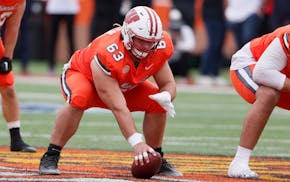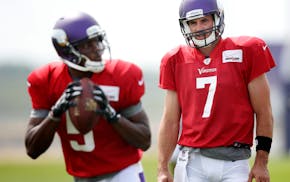When a running back has 144 yards rushing at halftime, it's only natural to wonder, ask, complain and/or scream at the top of one's purple-painted lungs, Why in the world did Adrian Peterson get only five carries in the second half!?
Usually, the typical Monday morning whining doesn't develop beyond that initial wave of second-guessing. But let's actually try to understand why Peterson played such a smaller part in the second half of Sunday's 30-20 loss at Seattle.
For starters, the two teams ran a combined 68 plays over 30 minutes of game time in the second half. The Vikings controlled the ball for 19 plays (27.9 percent) and 8 minutes, 50 seconds (29.4 percent).
Of those 19 plays, Peterson touched the ball seven times on five carries and two receptions. So we're down to 12 plays that we can use to hang offensive coordinator Bill Musgrave by his toenails from the tallest tree in town.
But wait. On four of those 12 plays, the intended target of a Christian Ponder pass was Percy Harvin, another superstar that everyone wants to see get the ball more. So now we're down to eight plays we can staple to Musgrave's eviction notice.
But wait. One of those plays was intended for tight end Kyle Rudolph on third-and-6. Remember him? Big guy with the catch radius of pterodactyl? The same guy that everyone wants to see get the ball more? So now we're down to seven plays for our "firecaptainmuskie.com" website.
But wait. There was that deep throw to Jerome Simpson, the guy everyone wants to see catch more deep balls. And there was that dropback while trailing by 10 points with 6 minutes left. And there was that other dropback on second-and-11 after Peterson had lost a yard on two of the previous three plays. And there was that other dropback on third-and-7, a down and distance that makes it impossible to hide even a struggling NFL quarterback.
So we're down to just three second-half plays to mix into Musgrave's tar and feathers. Here's a look at those plays:
First-and-10 from the Seattle 41-yard line, 3:05 left in the third: Ponder takes the snap from the shotgun as Peterson sneaks through the middle of the line, turns and looks for the ball 4 yards downfield. Ponder has plenty of time, but never looks at Peterson, who is uncovered. Ponder turns immediately and throws short right to rookie tight end Rhett Ellison, who gains 4 yards. It's safe to assume Peterson had the better chance of breaking tackles on a short pass with defenders nearby. Verdict: Ponder should have thrown the ball to Peterson.
First-and-10 from the Vikings' 6, 13:43 left in the game: There are only seven defenders in the box. A safety is creeping closer, but he's to the offense's right side when Ponder runs play-action to Peterson off left tackle. Harvin is lined up to the near left and runs 4 yards straight and cuts in. But the middle linebacker recognizes the play and easily cuts off the passing lane by simply dropping 3 yards. Ponder gives a quick look at Harvin, but wisely tucks the ball and runs for 2 yards. Verdict: Poor play design. The Vikings should have just run Peterson against a seven-man front.
Second-and-5 from the Vikings' 25, 12:05 left in the game: There are eight men in the box, and six of them are hugging the line of scrimmage. A pass is the right call. But Peterson stays in to pass protect -- his weakest area -- while fullback Jerome Felton releases into the right flat. Huh? With ample time, Ponder throws one of the worst of many bad passes on the day. The ball sails over Felton's outstretched hand and lands at Rudolph's feet. Felton is listed as the intended target in the stat book, but it could have been meant for Rudolph. One play later, with time to throw on third-and-5, Ponder throws incomplete behind Harvin on a crossing route. Verdict: Peterson -- not Felton -- needs to run the pass route. Of course, considering the horrendous throw, does it really matter?
Ponder's failure to execute is the primary reason the Vikings rank 26th in average time of possession (28:11). Atlanta, which has the offense the Vikings aspire to, ranks eighth (31:38).
That extra 3 minutes, 27 seconds of clock time might not seem like much. But you'd be amazed how much it would help in two critical areas the Vikings are struggling with: Resting a tired run defense and giving Musgrave even more realistic opportunities to use the league's best running back.
Mark Craig mark.craig@startribune.com

Flores channels 'inner Zimmer,' makes pitch for another cornerback

O'Connell has spent life around QBs. Can that help Vikings draft one?

Tackles are solid, but Vikings' offensive line still has big needs

